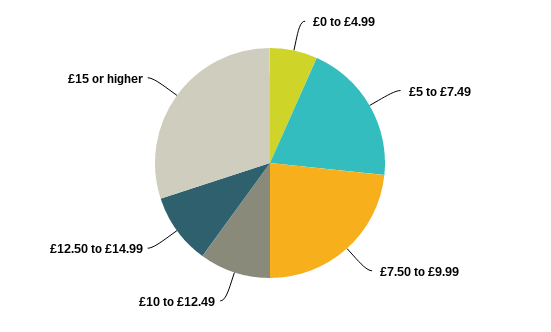Survey: How Do Graduates Feel About the Gig Economy?
Updated 13 March 2021
The gig economy is rarely out of the headlines at the moment, as more and more people are working in it, including plenty of students and graduates. But is the growth of the economy a good thing or a bad thing, and why?
To answer this, we surveyed our registered members to get their thoughts, and 125 of you responded. Here’s what you had to say:
There is a wide disparity in earnings.
Our findings showed that rather than gig economy jobs working out a low wage per hour, the picture is very mixed. Slightly over a quarter of respondents had earned under £7.50 per hour doing their gigs, but 30% had made more than £15 per hour (double the UK minimum wage).
How much do you estimate your hourly earnings were?
Overall, experiences of working in the gig economy are positive.
Three-fifths of those polled cited their experience of working in the gig economy as a positive one. By far the most common factor given for why it was positive was the flexible hours, allowing graduates to work when they wanted (89% of respondents gave this as the reason why they liked gig work).
What factors made the job positive?
The most common gripe with the gig economy is lack of sick leave and other benefits.
Lack of sick leave was the biggest complaint (57% of respondents mentioned this), although three other issues weren’t far behind:
- No holiday pay (50%)
- Not being able to work as much as I wanted to (50%)
- No minimum wage (37%)
What factors made the job negative?
Graduates are split on whether the emergence of the gig economy is good for them.
Asked if they felt the emergence of the gig economy was good for them, 54% of graduates said it was, while 46% said no. It’s interesting to look at some of the comments why people felt they way they did.
On the gig economy as positive for graduates:
“A quick and effective way of getting experience”
“You can make money in the hours you choose and fit it around studies”
“The gig economy can provide income for graduates who are struggling to get into the job market”
On the gig economy as negative for graduates:
“A bad experience for graduates, as the roles are low-paid and have no job security”
“Not good for employees - how can you plan life on a haphazard income? Not good for society, for the same reason”
“The gig economy represents part of an ongoing erosion of workers’ rights”
Over 40% of graduates would have to be desperate to consider doing a gig economy job permanently.
Graduates were asked how willing they would be to do a gig job on a permanent basis. A third (30%) said they would, while a quarter (26% ruled it out). The most popular response, cited by 44% of people, was that they would take a gig job in a permanent capacity only if they were desperate.
Would you consider doing a gig economy job on a permanent basis?
Amazon is the most admired gig economy employer among graduates; Yodel the least.
We asked each respondent to give the five companies below, all of whom can be considered gig employers to some extent, a rating out of 10 based on how much they admired them. These were the results:
- Amazon: 6.5
- Uber: 6
- Deliveroo:5
- Hermes: 4.5
- Yodel: 4



